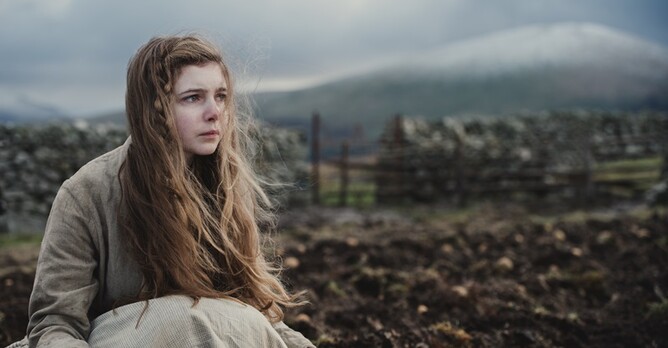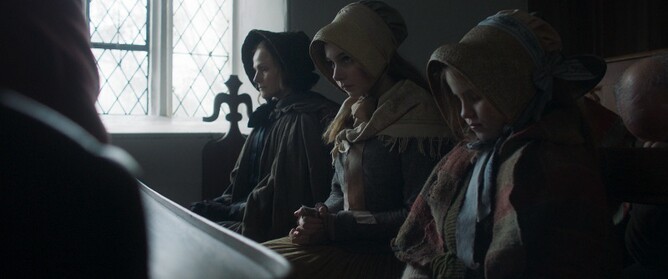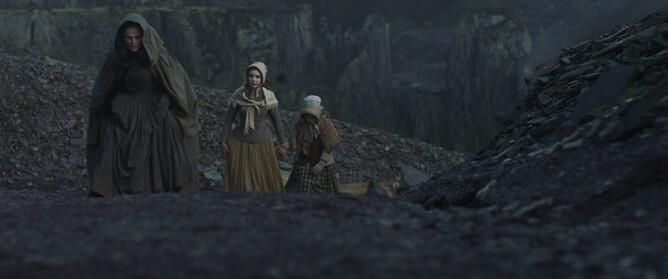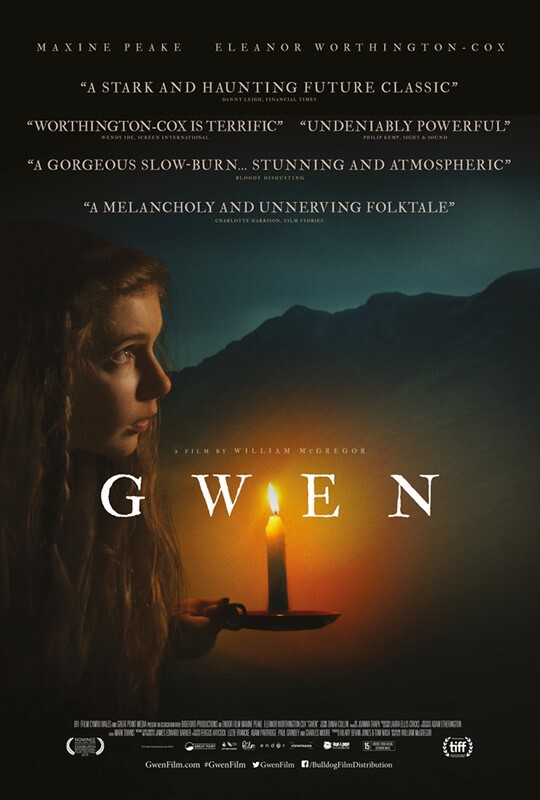GWEN: An accomplished period feature from talented British director William McGregor.
Already a regular director on the brilliantly successful ‘Poldark’ TV series, set in 18th century Cornwall, and the series director on the recent murder mystery, ‘One of Us,’ set in rural Scotland, McGregor clearly loves a sweeping landscape. So, it’s hardly surprising that McGregor chose the beautiful hills of Snowdonia, in rural, rugged 19th century Wales as the setting for GWEN. Also his first theatrical feature, GWEN, plays out against a particularly turbulent and brutal period in Welsh history, where this part of Wales underwent a sometimes cruel transformation, from pastoral farming to mining and industrialisation.
Gwen is played sensitively by upcoming 18-year old actress Eleanor Worthington-Cox.
The story centres around a family of a mother and her two daughters living alone on a farm, and the mother, ‘Elen,’ is wonderfully played by Maxine Peake in a role that really suits her. Her youngest daughter, ‘Mari,’ is only 5 or 6, and played by Jodie Innes, in her debut role. However, the central narrative is told from, Gwen, the oldest daughter’s point of view. Played sensitively by upcoming 18-year old actress Eleanor Worthington-Cox. Gwen, is a girl born during such times of upheaval that there is an element of displacement and inevitable sorrow about her character and her story right from the start.
A self-confessed lover of the works of Thomas Hardy, McGregor clearly enjoys looking at the darker side of human endeavour and growth, and exploring history, progress and the changing landscape of English culture through characters like Gwen, who are often victims of their time.
Gwen and Mari playing in the slate rich hills, gives a classic Gothic horror opening...
A sweet, carefree, innocent scene of Gwen and Mari playing in the slate rich hills, gives a classic Gothic horror opening, and sets up anticipation. Sure enough, as the girls make their way home, they come across a dark signpost that all is not well, when they pass one of the humble farmer’s houses near their own. The entire family are laid out ready for burial on the back of a wagon, and their small flock of sheep has been killed. From here on the story descends into dark tragedy, one brutal step after another. With steps made up of crushing abuse, debilitating sickness and heartrending betrayal, Gwen is pushed into such hideous grief, horror and heartbreak, that it challenges her sanity, with dark visions and reality but a breath apart. This sometimes makes for grim watching, but as a historical representation and study of human suffering about the age, it’s sadly an accurate picture.
GWEN will delight fans of period filmmaking.
However, there are times when more set up would’ve helped engage the audience, as this is not a famous, well known period in history. Also, at 84 minutes long there was definitely a few minutes room for it. However, with superb directing, the actors are all pulled together very well, and deliver strong, rounded performances. The production design is wonderful, by Laura Ellis Cricks, as is the attention to detail from the wardrobe design by Dinah Collin, and make-up/hair design by Niamh Morrison. The result is a film which is a testament to what can be achieved when the right team and cast are brought together under good direction. The cinematographer, Adam Etherington, who has also worked on Poldark, also lights just perfectly for an age which had no electricity. Taken altogether, the visual ‘world’ setting is very good, and, GWEN will delight fans of period filmmaking.
GWEN is released in UK/Irish Cinemas 19th July 2019, courtesy of Bulldog Film Distribution.
Jane Foster
janecreates@23-films.com




